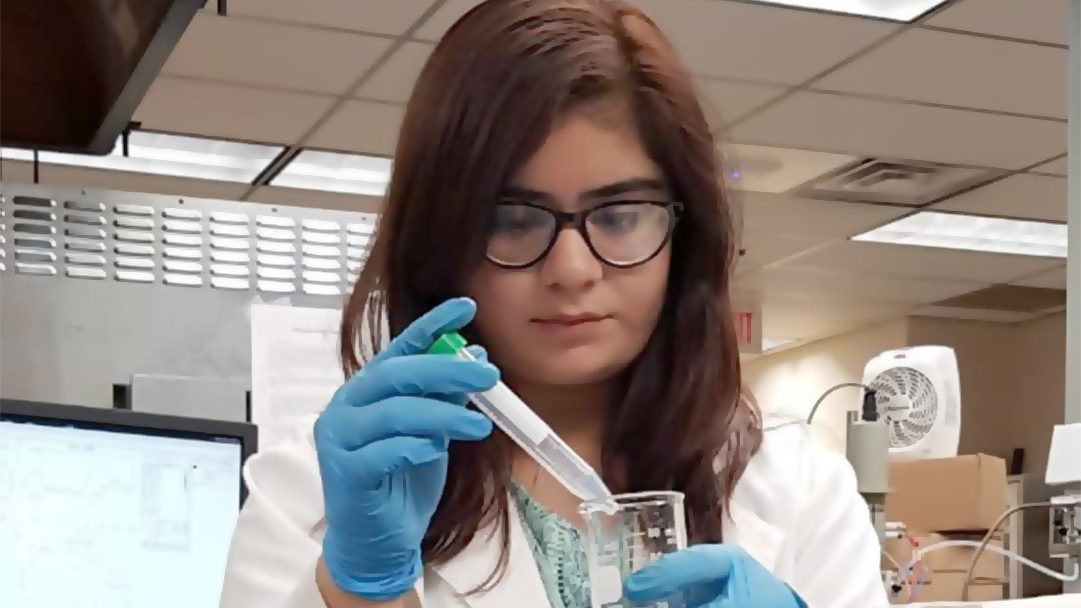On her drawing board: fuel cell solutions

USPCAS-E exchange scholar Afaf Ali has been hard at work conducting research which focuses on the development of a non-platinum catalyst for the fuel reduction reaction in proton exchange membrane fuel cells (PEMFC).
[et_pb_section bb_built=”1″ admin_label=”section”][et_pb_row admin_label=”row” background_position=”top_left” background_repeat=”repeat” background_size=”initial”][et_pb_column type=”4_4″][et_pb_text admin_label=”Text” background_position=”top_left” background_repeat=”repeat” background_size=”initial” _builder_version=”3.0.51″ background_layout=”light” text_orientation=”left” border_style=”solid”]
“Most people don’t know this, but I am a good sketch artist,” says Afaf Ali, a master’s candidate at the University of Engineering and Technology – Peshawar (UET-P). “I also do painting when I have enough free time,” she says.
Today, those kinds of creative outlets get little of Ali’s attention. As a USPCAS-E scholar and exchange student at Arizona State University, she’s been hard at work conducting research related to her master’s thesis, which focuses on the development of a non-platinum catalyst for the fuel reduction reaction in proton exchange membrane fuel cells (PEMFC).
Used primarily for transportation, PEMFC generate electricity through chemical reactions promoted through a catalyst, which usually is platinum, a very pricey element. A recent Reuters article noted that platinum is some 56,000 times more expensive than steel. Because of this, even the least expensive fuel-cell vehicles are twice the cost of similar electric vehicles.
Still, fuel cells hold great promise.
“This technology, if implemented at an economical cost, can be a breakthrough in the electric car industry,” Ali says.
Backed by this belief, she plans to pursue a doctorate while also engaging with industry to make her research practical and impactful.
[/et_pb_text][/et_pb_column][/et_pb_row][et_pb_row admin_label=”Row” background_position=”top_left” background_repeat=”repeat” background_size=”initial”][et_pb_column type=”2_3″][et_pb_text admin_label=”Text” _builder_version=”3.0.51″ background_layout=”light” text_orientation=”left” border_style=”solid”]
Science as service
As a USPCAS-E scholar, Ali has also worked on wind energy and it’s potential in Pakistan, in which coastal areas have much to offer, she notes. Like most students in the program, she’s committed to helping Pakistan overcome its energy shortages.
“Five years from now, I would like to see the commercial implementation of my current research work,” she says.
“Facing 10 to 12 hours of power cuts in the major cities of Pakistan surely makes you aware that something is really wrong with current energy policies and systems,” Ali says. “In rural areas, the situation is far worse. No electricity at all. We need to generate, conserve and secure energy.”
Ali adds that when she looked at the Pakistani energy crisis after getting her bachelor’s degree in chemical engineering at UET-P, she “felt a responsibility” to be part of the energy sector.
Service to country comes naturally to Ali, perhaps because her father is a retired air force officer. The eldest of four daughters, she says her dad urged all his girls to pursue scholastic excellence.
“His efforts led me to my path and my other sisters, as well,” she says.
With her father’s encouragement, Ali has gone beyond academics to pursue self-development in other areas. She’s attended a boot camp for social entrepreneurship and attended conferences on sustainability and green energy technologies.
So, despite her artistic talent, Ali doesn’t spend her days sketching landscapes and still life scenes. But, she is a dedicated USPCAS-E scholar eager to return to her native land.
“I am looking forward to completing my research and being a part of positive change in Pakistan,” she says. “We are the future that can save our country from the immense energy crisis. That is what motivates me.”
[/et_pb_text][/et_pb_column][et_pb_column type=”1_3″][et_pb_image admin_label=”Image” _builder_version=”3.0.51″ src=”https://uspcase.asu.edu/wp-content/uploads/sites/76/2018/11/Afaf-Ali-IMG_1650-w.jpg” show_in_lightbox=”off” url_new_window=”off” use_overlay=”off” sticky=”off” align=”left” always_center_on_mobile=”on” border_style=”solid” force_fullwidth=”off” /][/et_pb_column][/et_pb_row][et_pb_row admin_label=”Row” background_position=”top_left” background_repeat=”repeat” background_size=”initial”][et_pb_column type=”4_4″][et_pb_text admin_label=”Text” _builder_version=”3.0.51″ background_layout=”light” text_orientation=”left” border_style=”solid” saved_tabs=”all” global_module=”2599″]
By Betsy Loeff
[/et_pb_text][/et_pb_column][/et_pb_row][/et_pb_section]